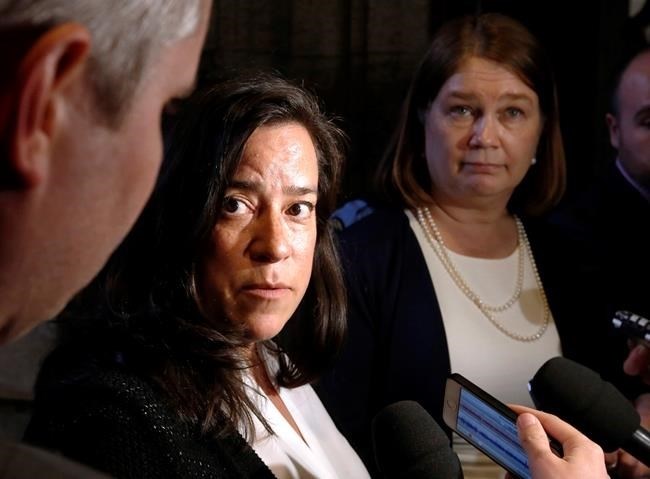
Minister of Justice Jody Wilson-Raybould and Health Minister Jane Philpott, right, talk to reporters outside the House of Commons on Tuesday May 31, 2016 in Ottawa. Wilson-Raybould likes to cite the case of E.F. when she warns of the danger that will exist as of 12:00 a.m. Monday, when medically assisted dying becomes legal in Canada without any law in place to impose safeguards.
Image Credit: THE CANADIAN PRESS/Fred Chartrand
June 06, 2016 - 7:00 AM
OTTAWA - Jody Wilson-Raybould likes to cite the case of E.F. when she warns of the danger that will exist as of Monday, when medically assisted dying becomes legal in Canada without any law in place to impose safeguards.
But the federal justice minister hasn't told the full story of how E.F. — a 58-year-old Alberta woman who died last week —obtained judicial approval to end her suffering with medical help, said the woman's lawyer, Trista Caley.
To hear Wilson-Raybould tell it, E.F. "was suffering from a mental illness and ... a psychiatrist had approved (her) eligibility for medical assistance over Skype."
"I don't think that's a situation that we want to get into," she warned Liberals at the ruling party's national convention in Winnipeg last month.
That account isn't accurate, according to Caley.
E.F.'s application for an assisted death was supported by three doctors: her long-time attending physician — who had treated her for 28 years, including referrals to several psychiatrists and at least one neurologist — an assisting doctor and a psychiatrist with expertise in E.F.'s condition, who reviewed her medical file but did not examine her.
It was the assisting doctor, based in Vancouver, who used Facetime to interview E.F, "in addition to" a full review of her entire medical chart, multiple telephone conversations with her attending physician and email exchanges with a long-time friend, Caley said in an email to The Canadian Press.
She noted that the use of electronic interface between doctors and patients is a widely accepted practice that is actually promoted by provincial telehealth programs.
"I question why this is acceptable practice except when utilized in the context of allowing our client to connect with a health care provider prepared to her assist her (who was) located in a different geographic location from her," Caley said.
In any event, Caley said affidavits from the three doctors were in evidence before Alberta's Court of Queen's Bench, which granted E.F. an exemption from the ban on assisted dying, and again before the Alberta Court of Appeal, which upheld the lower court's decision. In both courts, federal lawyers argued that the medical evidence of E.F.'s eligibility, particularly from the psychiatrist, was insufficient.
"At both levels of court, those arguments were rejected," Caley said.
E.F., whose name has never been disclosed to protect her and her family's privacy, had suffered for nine years from a psychiatric illness called "severe conversion disorder." It caused her muscles to spasm involuntarily, producing constant pain and migraines and rendering her effectively blind, incapable of walking and often incapable of eating.
All three doctors agreed that E.F. was competent and enduring intolerable suffering that was irremediable. The Alberta Court of Appeal agreed, in the process blasting a hole in the rationale that the federal government has used to justify its restrictive approach to assisted dying.
The appeal court said precluding a person who is not near death or suffering strictly from a psychological illness is inconsistent with the Supreme Court's directive that assisted dying should be available to consenting adults with "grievous and irremediable" medical conditions who are enduring suffering that is intolerable to them.
The federal government's proposed new law takes a more restrictive approach, allowing assisted death only for consenting adults "in an advanced stage of irreversible decline" from a serious and incurable disease, illness or disability and for whom a natural death is "reasonably foreseeable."
News from © The Canadian Press, 2016